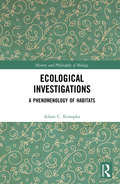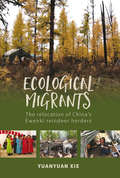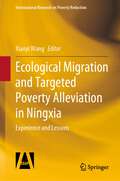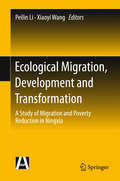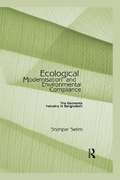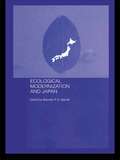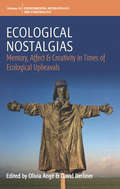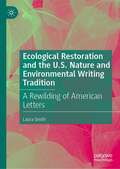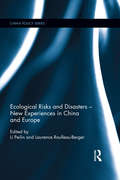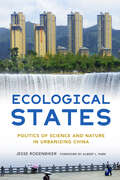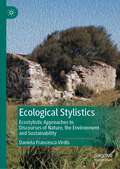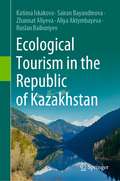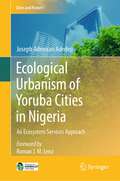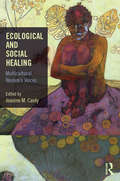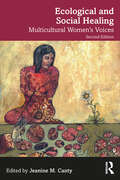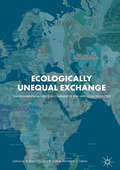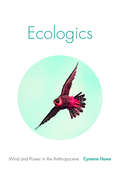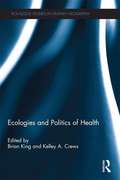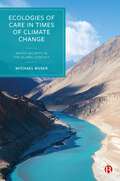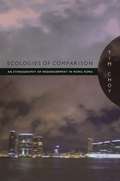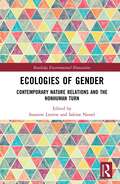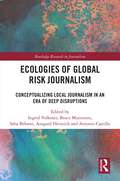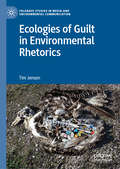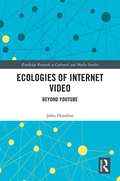- Table View
- List View
Ecological Imperialism
by Alfred W. CrosbyPeople of European descent form the bulk of the population in most of the temperate zones of the world - North America, Australia and New Zealand. The military successes of European imperialism are easy to explain; in many cases they were a matter of firearms against spears. But, as Alfred Crosby maintains in this highly original and fascinating book, the Europeans' displacement and replacement of the native peoples in the temperate zones was more a matter of biology than of military conquest. European organisms had certain decisive advantages over their New World and Australian counterparts. The spread of European disease, flora, and fauna went hand in hand with the growth of populations. Consequently, these imperialists became proprietors of the world's most important agricultural lands. Now in a new edition with a new preface, Crosby revisits his now-classic work and again evaluates the global historical importance of European ecological expansion.
Ecological Investigations: A Phenomenology of Habitats (History and Philosophy of Biology)
by Adam C. KonopkaThese investigations identify and clarify some basic assumptions and methodological principles involved in ecological explanations of plant associations. How are plants geographically distributed into characteristic groups? What are the basic conditions that organize groups of interspecific plant populations that are characteristic of particular kinds of habitats? Answers to these questions concerning the geographical distribution of plants in late 19th century European plant geography and early 20th century American plant ecology can be distinguished according to differing logical assumptions concerning the habitats of plant associations. Through an analysis of several significant case studies in the early history of plant ecology, Konopka distinguishes a logic of habitats that conceives of plant associations in an analogy to individual organisms with a logic that conceives of plant associations in a reciprocal relation to habitat physiography. He argues that a phenomenological conception of the logical attributes of habitats can philosophically complement the physiographic tradition in early plant ecology and provide an attractive alternative to standard reductionism and holism debates that persist today. This wide ranging and original analysis will be valuable for readers interested in the history and philosophy of ecology.
Ecological Migrants: The Relocation of China's Ewenki Reindeer Herders
by Yuanyuan XieReindeer-herding Ewenki hunters have lived in the forests of China’s Greater Khingan Range for over three hundred years. They have sustained their livelihoods by collecting plants and herbs, hunting animals and herding reindeer. This ethnography details changing Ewenki ways of life brought first by China’s modernization and development policies and more recently by ecological policies that aim to preserve and restore the badly damaged ecologies of western China. Xie reflects on modernization and urbanization in China through this study of ecological migration policies and their effects on relocated Aoluguya Ewenki hunters.
Ecological Migration and Targeted Poverty Alleviation in Ningxia: Experience and Lessons (International Research on Poverty Reduction)
by Xiaoyi WangThis book assesses Ecological Migration and Precision Poverty Alleviation Measures, based on research conducted in Ningxia. “Resettling residents currently living in poor areas” is an important measure for “precise poverty alleviation.” China’s central government has provided extraordinary support for these areas, so as to help with “removing poverty nests,” “changing poverty industries,” and “pulling out the roots of poverty.”This book is mainly based on research conducted in Ningxia, one of the earliest areas in China to achieve poverty alleviation and development through immigration and relocation. Since the Twelfth Five-Year Plan, Ningxia’s ecological migration has been integrated into the process of new urbanization and industrialization. Poverty alleviation and relocation not only involves regional transfer, industrial transformation, and changes in livelihood, but also the social adaptation and integration of migrant groups. In addition to examining these aspects, the book shares stories of how impoverished individuals have succeeded in changing their fates.
Ecological Migration, Development and Transformation
by Peilin Li Xiaoyi WangAfter over 30 years of reform and opening up, China's aggregate economic volume is now the second largest in the world. Over the past decade many provinces in the western region of China have implemented ecological migration projects of different scales, which have attracted considerable attention both in China and abroad. The projects indicate, first, that there is an urgent need for this type of endeavor: whether the goal is to reduce poverty or to protect the environment, we need to move the poor populations out of the ecologically fragile regions. Secondly, the projects indicate that the Chinese government is capable of meeting this need. Migration projects are complex and costly and without sufficient financial resources and systematic planning, migration may fail to reduce poverty, and could even aggravate it. The rapid economic growth in China, however, makes such migration projects viable.
Ecological Modernisation and Environmental Compliance: The Garments Industry in Bangladesh
by Shahpar SelimEconomic development that is environmentally, socially and ethically sound is at the forefront of contemporary debates all over the world. This is especially relevant to international trade where goods manufactured in least developed countries (LDCs) are being exported to developed countries (DCs) via international supply chains. This book looks at Bangladesh’s ready-made garments (RMG) industry – the seventh largest in the world — facing demands for environmental and social management according to standards set by consumers in environmentally progressive societies. Apart from these concerns not having found cultural or institutional resonance in Bangladesh, the pressures for cost reduction, on-time delivery and cheap labour in a highly competitive international market make the problem that much more complex. In this book Selim uses the analytical framework provided by the ecological modernisation theory to examine the economic, communicative and social political aspects of ethical trade, and argues that the economy-ecology relationship can indeed be a positive sum game if nation-states and economic actors change their policymaking styles and greening behaviour to take advantage of scientific evidence and green technological opportunities.
Ecological Modernisation and Japan
by Brendan F.D. BarrettIn the 1990s, Japan gradually began to turn green and started to experiment with more participatory forms of environmental governance. Ecological Modernisation and Japan explores this transformation and looks at Japan as a case for ecological modernisation while contextualising the discussion within its unique history and recent discussions about globalisation and sustainability. It makes a significant contribution to the ecological modernisation debate by unpacking the Japanese environmental experience.
Ecological Nostalgias: Memory, Affect and Creativity in Times of Ecological Upheavals (Environmental Anthropology and Ethnobiology #26)
by David Berliner Olivia AngéIntroducing the study of econostalgias through a variety of rich ethnographic cases, this volume argues that a strictly human centered approach does not account for contemporary longings triggered by ecosystem upheavals. In this time of climate change, this book explores how nostalgia for fading ecologies unfolds into the interstitial spaces between the biological, the political and the social, regret and hope, the past, the present and the future.
Ecological Restoration and the U.S. Nature and Environmental Writing Tradition: A Rewilding of American Letters
by Laura SmithThis book presents a critical history of the intersections between American environmental literature and ecological restoration policy and practice. Through a storying—restorying—restoring framework, this book explores how entanglements between writers and places have produced literary interventions in restoration politics. The book considers the ways literary landscapes are politicized by writers themselves, and by conservationists, activists, policymakers, and others, in defense of U.S. public lands and the idea of wilderness. The book profiles five environmental writers and examines how their writings on nature, wildness, wilderness, conservation, preservation, and restoration have variously inspired and been translated into ecological restoration programs and campaigns by environmental organizations. The featured authors are Henry David Thoreau (1817–1862) at Walden Pond, John Muir (1838–1914) in Yosemite National Park, Aldo Leopold (1887–1948) at his family’s Wisconsin sand farm, Marjory Stoneman Douglas (1890–1998) in the Everglades, and Edward Abbey (1927–1989) in Glen Canyon. This book combines environmental history, literature, biography, philosophy, and politics in a commentary on considering (and developing) environmental literature’s place in conversations on restoration ecology, ecological restoration, and rewilding.
Ecological Risks and Disasters - New Experiences in China and Europe (China Policy Series)
by Li Peilin Laurence Roulleau-BergerClimate change, and also other factors, are capable of bringing about major disasters on a scale hitherto unimaginable. Ecological and other risks, besides having scientific and technological dimensions, are also a subject of study for social scientists, concerned with how disasters and potential disasters are noticed, perceived, guarded against, managed once they have occurred, and coped with after they have happened. This book considers a range of ecological risks and disasters and how they are managed in both China and Europe. It examines how far risks and disasters are perceived and managed in different ways in Europe and China, explores how an increasing humanitarian approach to "vulnerable people" being taken up in Europe is also being adopted in China, and assesses how far the management of disasters differs from wider government management of more ordinary aspects of everyday life. The book argues that the same stresses and strains which are present in normal society are there also, in enhanced form, in disaster situations.
Ecological States: Politics of Science and Nature in Urbanizing China (The Environments of East Asia)
by Jesse RodenbikerEcological States critically examines ecological policies in the People's Republic of China to show how campaigns of scientifically based environmental protection transform nature and society. While many point to China's ecological civilization programs as a new paradigm for global environmental governance, Jesse Rodenbiker argues that ecological redlining extends the reach of the authoritarian state.Although Chinese urban sustainability initiatives have driven millions of citizens from their land and housing, Rodenbiker shows that these migrants are not passive subjects of state policy. Instead, they creatively navigate resettlement processes in pursuit of their own benefit. However, their resistance is limited by varied forms of state-backed infrastructural violence. Through extensive fieldwork with scientists, urban planners, and everyday citizens in southwestern China, Ecological States exposes the ways in which the scientific logics and practices fundamental to China's green urbanization have solidified state power and contributed to dispossession and social inequalityWith support from the Henry Luce Foundation, our goal is to produce all titles in this series both in Open Access, for reasons of global accessibility and equity, as well as in print editions.
Ecological Stylistics: Ecostylistic Approaches to Discourses of Nature, the Environment and Sustainability
by Daniela Francesca VirdisThis book reflects the cutting edge in ecostylistic approaches to nature, the environment and sustainability as represented in contemporary non-literary discourse. Firstly, the book presents the ecolinguistic and stylistic terms and theories applied in this ecostylistic analysis (ecosophy, beneficial, ambivalent and destructive discourses; and foregrounding, point of view, metaphor), and reviews the most recent literature in the field of ecostylistics. Secondly, the book examines the occurrences of five marker words (nature, environment, ecosystem, ecology, sustainability) on the websites of five environmental organisations and agencies (Forestry England, Greenpeace International, National Park Service, Navdanya International, World Wide Fund for Nature). The main research purpose of this study is to identify beneficial discourses in the environet and to investigate the beneficial ecostylistic strategies utilised to produce them. Above all, this book reminds us humans that we do not stand apart from nature: we are a part of it. The book will be of interest to scholars of stylistics, ecolinguistics and ecocriticism, as well as scholars of discourse analysis, environmental communication and environmental humanities.
Ecological Tourism in the Republic of Kazakhstan
by Sairan Bayandinova Katima Iskakova Zhannat Aliyeva Aliya Aktymbayeva Ruslan BaiburiyevThis book analyses the theoretical and methodological foundations of ecotourism and geotourism and examines the essence, content, factors, and models of ecotourism development. The authors conducted research to assess the tourist and recreational potential of ecotourism in Kazakhstan. The study analyses the current state and describes the problems of the long-term development of ecotourism. Besides, the authors also show the role of specially protected natural areas in ecotourism development, including a list of organizations that can create tourist products in the environmental direction. This book also defines the primary conditions necessary for ecotourism in protected natural and rural areas. The resulting cartographic material visualizes the geospatial potential of the regions of Kazakhstan, aiming a more targeted expenditure of financial resources allocated to tourism development. Thus, the presented book is relevant from a practical perspective to scientists and researchers and is of value to business structures and stakeholders.
Ecological Urbanism of Yoruba Cities in Nigeria: An Ecosystem Services Approach (Cities and Nature)
by Joseph Adeniran AdedejiThis book offers in-depth ethnographic analyses of key informants’ interviews on the ecological urbanism and ecosystem services (ES) of selected green infrastructure (GI) in Yoruba cities of Ile-Ife, Ibadan, Osogbo, Lagos, Abeokuta, Akure, Ondo, among others in Southwest Nigeria. It examines the Indigenous Knowledge System (IKS) demonstrated for wellbeing through home gardens by this largest ethno-linguistic group in Nigeria. This is in addition to the ES of Osun Grove UNESCO World Heritage Site, Osogbo; Biological Garden and Park, Akure; Lekki Conservation Centre, Lagos; Adekunle Fajuyi Park, Ado-Ekiti; Muri Okunola Park, Lagos; and some institutional GI including University of Ibadan Botanical Gardens, Ibadan; Federal University of Agriculture Abeokuta Botanical Garden, Abeokuta; and University of Lagos Lagoon Front Resort, Lagos, Nigeria. The study draws on theoretical praxis of Western biophilic ideologies, spirit ontologies of the Global South, and largely, Millennium Ecosystem Assessment (2005) to examine eco-cultural green spaces, home gardens, and English-types of parks and gardens as archetypes of GI in Yoruba traditional urbanism, colonial and post-colonial city planning. The book provides methods of achieving a form of modernized traditionalism as means of translating the IKS into design strategies for eco-cultural cities. The strategies are framework, model, and ethnographic design algorithms that are syntheses of the lived experiences of the key informants.
Ecological and Social Healing: Multicultural Women's Voices
by Jeanine M. CantyThis book is an edited collection of essays by fourteen multicultural women (including a few Anglo women) who are doing work that crosses the boundaries of ecological and social healing. The women are prominent academics, writers and leaders spanning Native American, Indigenous, Asian, African, Latina, Jewish and Multiracial backgrounds. The contributors express a myriad of ways that the relationship between the ecological and social have brought new understanding to their experiences and work in the world. Moreover by working with these edges of awareness, they are identifying new forms of teaching, leading, healing and positive change. Ecological and Social Healing is rooted in these ideas and speaks to an "edge awareness or consciousness." In essence this speaks to the power of integrating multiple and often conflicting views and the transformations that result. As women working across the boundaries of the ecological and social, we have powerful experiences that are creating new forms of healing. This book is rooted in academic theory as well as personal and professional experience, and highlights emerging models and insights. It will appeal to those working, teaching and learning in the fields of social justice, environmental issues, women's studies, spirituality, transformative/environmental/sustainability leadership, and interdisciplinary/intersectionality studies.
Ecological and Social Healing: Multicultural Women's Voices
by Jeanine M. CantyA compendium of diverse women and nonbinary femmes, the second, expanded edition of this book highlights the contributors’ journeys with straddling social and ecological issues through both their professional and personal paths and reveals how straddling these edges has surfaced new learning, models, and practices for collective healing. The contributors span multiple generations and positionalities and are prominent academics, writers, teachers, artists, leaders, and healers. Ecological and Social Healing is rooted in the power of integrating multiple and often conflicting views and the transformations that result.This book is rooted in academic theory as well as personal and professional experience and highlights emerging models and insights. It will appeal to those working, teaching, and learning in the fields of social justice, environmental issues, women and gender studies, animal rights, ecopsychology, spirituality, transformative studies, transdisciplinarity, leadership, and interdisciplinary/intersectionality studies, as well as anyone straddling the boundaries of gender, race, ecology, and the crises of our times and are looking for new ways of being.
Ecologically Unequal Exchange: Environmental Injustice in Comparative and Historical Perspective
by Harry F. Dahms R. Scott Frey Paul K. GellertAt a time of societal urgency surrounding ecological crises from depleted fisheries to mineral extraction and potential pathways towards environmental and ecological justice, this book re-examines ecologically unequal exchange (EUE) from a historical and comparative perspective. The theory of ecologically unequal exchange posits that core or northern consumption and capital accumulation is based on peripheral or southern environmental degradation and extraction. In other words, structures of social and environmental inequality between the Global North and Global South are founded in the extraction of materials from, as well as displacement of waste to, the South. This volume represents a set of tightly interlinked papers with the aim to assess ecologically unequal exchange and to move it forward. Chapters are organised into three main sections: theoretical foundations and critical reflections on ecologically unequal exchange; empirical research on mining, deforestation, fisheries, and the like; and strategies for responding to the adverse consequences associated with unequal ecological exchange. Scholars as well as advanced undergraduate and graduate students will benefit from the spirited re-evaluation and extension of ecologically unequal exchange theory, research, and praxis.
Ecologics: Wind and Power in the Anthropocene
by Cymene HoweBetween 2009 and 2013 Cymene Howe and Dominic Boyer conducted fieldwork in Mexico's Isthmus of Tehuantepec to examine the political, social, and ecological dimensions of moving from fossil fuels to wind power. Their work manifested itself as a new ethnographic form: the duograph—a combination of two single-authored books that draw on shared fieldsites, archives, and encounters that can be productively read together, yet can also stand alone in their analytic ambitions. In her volume, Ecologics, Howe narrates how an antidote to the Anthropocene became both failure and success. Tracking the development of what would have been Latin America's largest wind park, Howe documents indigenous people's resistance to the project and the political and corporate climate that derailed its renewable energy potential. Using feminist and more-than-human theories, Howe demonstrates how the dynamics of energy and environment cannot be captured without understanding how human aspirations for energy articulate with nonhuman beings, technomaterial objects, and the geophysical forces that are at the heart of wind and power.
Ecologies and Politics of Health: Ecologies And Politics Of Health (Routledge Studies in Human Geography)
by Brian King Kelley A. CrewsHuman health exists at the interface of environment and society. Decades of work by researchers, practitioners, and policy-makers has shown that health is shaped by a myriad of factors, including the biophysical environment, climate, political economy, gender, social networks, culture, and infrastructure. Yet while there is emerging interest within the natural and social sciences on the social and ecological dimensions of human disease and health, there have been few studies that address them in an integrated manner. Ecologies and Politics of Health brings together contributions from the natural and social sciences to examine three key themes: the ecological dimensions of health and vulnerability, the socio-political dimensions of human health, and the intersections between the ecological and social dimensions of health. The thirteen case study chapters collectively present results from Africa, Asia, Latin America, the United States, Australia, and global cities. Section one interrogates the utility of several theoretical frameworks and conventions for understanding health within complex social and ecological systems. Section two concentrates upon empirically grounded and quantitative work that collectively redefines health in a more expansive way that extends beyond the absence of disease. Section three examines the role of the state and management interventions through historically rich approaches centering on both disease- and non-disease-related examples from Latin America, Eastern Africa, and the United States. Finally, Section four highlights how health vulnerabilities are differentially constructed with concomitant impacts for disease management and policy interventions. This timely volume advances knowledge on health-environment interactions, disease vulnerabilities, global development, and political ecology. It offers theoretical and methodological contributions which will be a valuable resource for researchers and practitioners in geography, public health, biology, anthropology, sociology, and ecology.
Ecologies of Care in Times of Climate Change: Water Security in the Global Context
by Michael BuserThis book investigates and analyses places in Europe, North America and Asia that are facing the immense challenges associated with climate change adaptation. Presenting real-world cases in the contexts of coastal change, drinking water and the cryosphere, Michael Buser shows how the concept of care can be applied to water security and climate adaptation. Exploring the everyday and often hidden ways in which water security is accomplished, the book demonstrates the pervasiveness and power of care to contribute to flourishing lives and communities in times of climate change.
Ecologies of Comparison: An Ethnography of Endangerment in Hong Kong
by Timothy ChoyA rich ethnography of ecopolitics in Hong Kong in the late 1990s, as the region shifted to Chinese sovereignty, Ecologies of Comparison describes how ecological concepts of uniqueness and scale resonated among environmentalists, including those seeking to preserve a species of white dolphin, to protect an aging fishing village from redevelopment, and to legitimize air quality as an object of political and medical concern. During his research, Tim Choy became increasingly interested in the power of the notion of specificity. While documenting the expert and lay production of Hong Kong's biological, cultural, and political specificities, he began comparing the logics and narrative forms that made different types of specificity--such as species, culture, locality, and state autonomy--possible and meaningful. He came to understand these logics and forms as "ecologies of comparison," conceptual practices through which an event or form of life comes to matter in environmentalist and other political terms. Choy's ethnography is about environmentalism, Hong Kong, and the ways that we think about environmentalism in Hong Kong and other places. It is also about how politics, freedom, culture, expertise, and other concepts figure in comparison-based knowledge practices.
Ecologies of Gender: Contemporary Nature Relations and the Nonhuman Turn (Routledge Environmental Humanities)
by Susanne LettowEcologies of Gender: Contemporary Nature Relations and the Nonhuman Turn examines the role of gender in recent debates about the nonhuman turn in the humanities, and critically explores the implications for a contemporary theory of gender and nature relations. The interdisciplinary contributions in this volume each provides theoretical reflections based on an analysis of specific naturecultural processes. They reveal how "ecologies of gender" are constructed through aesthetic, epistemological, political, technological and economic practices that shape multispecies and material interrelations as well as spatial and temporal orderings. The volume includes contributions from cultural anthropology, cultural studies, film studies, literary studies, media studies, philosophy and theatre studies. The essays are organized around four key dimensions of an "ecological" understanding of gender: "creatures", "materials", "spaces" and "temporalities". The overall aim of the volume Ecologies of Gender: Contemporary Nature Relations and the Nonhuman Turn is to explore the potentialities and limitations of the nonhuman turn for a critical analysis and theory of ecologies of gender, and thereby make an original contribution to both the environmental humanities and gender studies. This book will be of great interest to scholars and students from the interdisciplinary field of the environmental humanities and environmental studies more broadly, as well as from gender studies and cultural theory.
Ecologies of Global Risk Journalism: Conceptualizing Local Journalism in an Era of Deep Disruptions (Routledge Research in Journalism)
by Ingrid Volkmer Saba Bebawi Bruce Mutsvairo Ansgard Heinrich Antonio CastilloThis volume investigates the practice and challenges of journalism addressing globalized risk from various world regions.With chapters written by members of the Global Risk Journalism Hub, an international research network of leading scholars from the Global North and Global South, this collection brings together international journalism researchers from a wide range of theoretical and methodological backgrounds to uncover key issues of "global risk journalism" within their regional contexts. Using the climate crisis and the COVID-19 pandemic as a point of departure, this book explores the effect of digital platforms on news production, how the reporting of these transnational emergencies affects the misinformation ecosystem, the power relations between global and local news sources and the ethics of conducting research in the face of globalized crises.This truly international and comparative volume will interest researchers and students of global and local journalism, risk journalism, journalism practice, media and communication studies, intercultural communication, political science and sociology.
Ecologies of Guilt in Environmental Rhetorics (Palgrave Studies in Media and Environmental Communication)
by Tim JensenEnvironmental rhetorics have expanded awareness of mass extinction, climate change, and pervasive pollution, yet failed to generate collective action that adequately addresses such pressing matters. This book contends that the anemic response to ecological upheaval is due, in part, to an inability to navigate novel forms of environmental guilt. Combining affect theory with rhetorical analysis to examine a range of texts and media, Ecologies of Guilt in Environmental Rhetorics positions guilt as a keystone emotion for contemporary environmental communication, and explores how it is provoked, perpetuated, and framed through everyday discourse. In revealing the need for emotional literacies that productively engage our complicity in global ecological harm, the book looks to a future where guilt—and its symbiotic relationships with anger, shame, and grief—is shaped in tune with the ecologies that sustain us.
Ecologies of Internet Video: Beyond YouTube (Routledge Research in Cultural and Media Studies)
by John HondrosThis book explores the complex, dynamic, and contested webs of relationships in which three different groups of video makers found themselves when distributing their work on the Internet. It draws upon both the Deleuzian notion of "assemblage" and Actor-Network Theory, which together provide a rich conceptual framework for characterizing and analysing these webs. The groups examined are a UK video activist project, a community of film and television fans originating in the US, and an association of US community television producers. Rather than taking YouTube as its point of departure, this book centres on the groups themselves, contextualizing their contemporary distribution practices within their pre-Internet histories. It then follows the groups as they drew upon various Internet technologies beyond YouTube to create their often-complex video distribution assemblages, a process that entangled them in these webs of relationships. Through the analysis of detailed ethnographic fieldwork conducted across a period of several years, this book demonstrates that while the groups found some success in achieving their various goals as video makers, their situations were often problematic and their agency limited, with their practices contested by both human and technological actors within their distribution assemblages.

